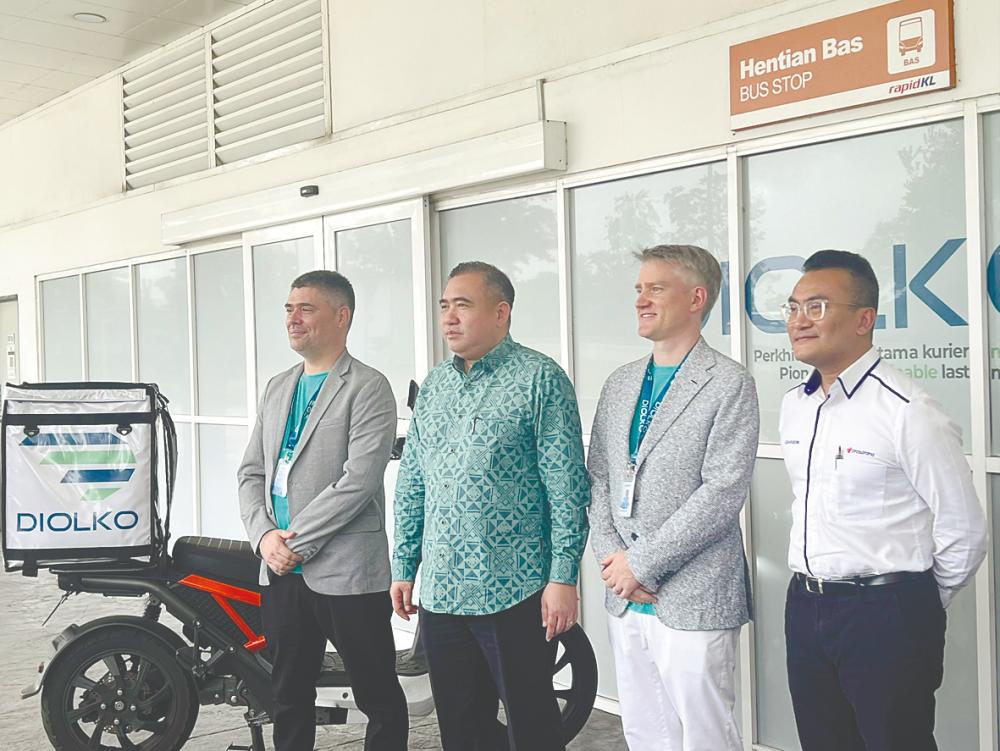KUALA LUMPUR: Malaysia-based logistics company Diolko Logistics Malaysia Sdn Bhd is pioneering green delivery solutions to reduce carbon emissions and alleviate urban congestion.
Diolko CEO Yoann Gueguen said that by leveraging public transport systems, including the Rapid Kuala Lumpur rail network, the company aims to revolutionise last-mile logistics in Southeast Asia.
“We are proud to offer a fully sustainable, end-to-end delivery solution that cuts emissions while optimising urban assets. Our approach reduces congestion and transforms how goods are transported in cities,” he said during Transport Minister Anthony Loke’s site visit at Diolko’s Putra Heights LRT Station hub yesterday.
Gueguen remarked that Diolko’s pilot initiative in collaboration with Prasarana Malaysia Bhd, the LRT Parcel Project, has achieved 70% reduction in carbon emissions across more than 1,000 deliveries since its launch in July.
“By integrating electric vehicles with public transport hubs, the company minimises fleet requirements and enhances efficiency. Tapping into rail transport not only reduces road traffic but also enables us to fully harness electric vehicle (EV) technology within station-centric routes,” he explained.
Gueguen highlighted the significant potential of the project, stating that the rail network has a substantial capacity for parcel movement, with lines capable of handling up to 90,000 parcels per day. “Currently, we are utilising two lines with a daily capacity of 15,000 parcels, but there is tremendous room for scaling up.”
On delivery rates, he said pricing will follow a market-based configuration, ensuring competitiveness while offering premium value to its clients.
“Rates are primarily determined by weight and volume of the parcels. Our standard price for next-day delivery service for parcels weighing up to 3kg is RM5.30. However, it is important to note that final pricing is adjusted based on the terms of the contract we have with each client, taking into account factors such as shipment volume, service type and specific client needs,” he added.
Looking ahead, Gueguen said Diolko plans to expand to 15 transit stations by 2027, scaling its operations to handle greater parcel volumes and create new job opportunities.
“This expansion reflects our commitment to helping businesses achieve their sustainability goals and contributing to a cleaner urban environment.
“Diolko is not just about delivering parcels. It is about delivering solutions to critical urban challenges. Our mission is to transform the way goods are transported in cities while ensuring a tangible positive impact on the environment.”
Loke lauded the project’s alignment with national policies.
“This innovative concept fully utilises EVs and trains to deliver parcels, aligning perfectly with our green transition and national transport policies. It is a sustainable solution that optimises our urban rail assets and enhances environmental, social and governance compliance, attracting multinational companies seeking eco-friendly logistics providers,” he said at a press conference after the site visit.
He noted that the pilot project is the first of its kind in Southeast Asia.
“This is a pioneering concept for the region, and the Transport Ministry fully supports its growth, both locally and internationally. Beyond Kuala Lumpur, the model could be expanded to other cities and cross-border initiatives like the RTS link between Johor Bahru and Singapore,” Loke said.
The initiative is setting new benchmarks for green mobility in Malaysia, optimising the use of existing rail infrastructure to enhance both economic and environmental outcomes, the minister added.









